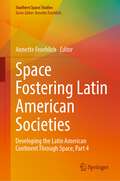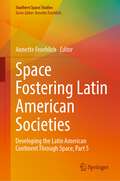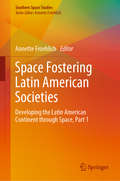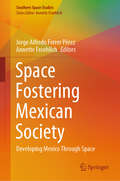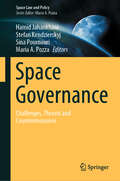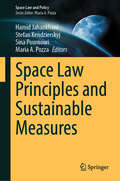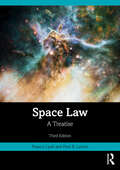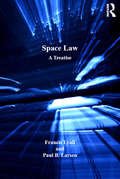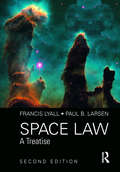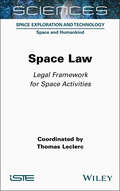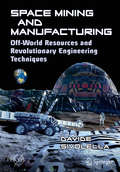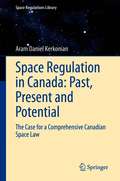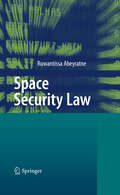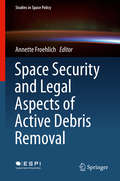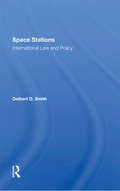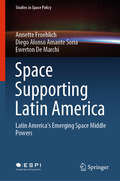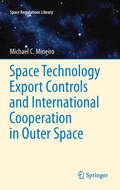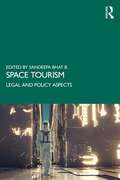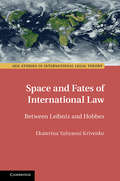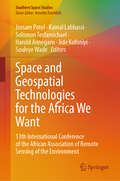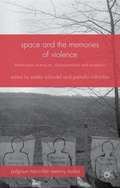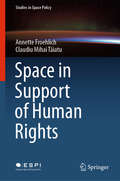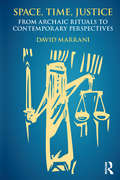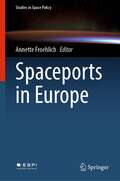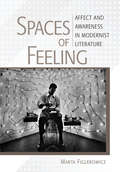- Table View
- List View
Space Fostering Latin American Societies: Developing the Latin American Continent Through Space, Part 4 (Southern Space Studies)
by Annette FroehlichThis peer-reviewed book presents a comprehensive overview of the role space is playing in enabling Latin America to fulfil its developmental aspirations. Following on from the highly acclaimed Parts 1 to 3, it explains how space and its applications can be used to support the development of the full range and diversity of Latin America societies, while being driven by Latin American goals. The Latin American space sector is currently undergoing a phase of rapid and dynamic expansion, with new actors entering the field and with space applications increasingly being used to support the continent’s social, economic, and political development. All across Latin America, attention is shifting to space as a fundamental part of the continental development agenda, and the creation of a Latin American space agency is evidence of this. Additionally, while in recent years, significant advances in economic and social development have lifted many of Latin America’s people out of poverty, there is still much that needs to be done to fulfil the basic needs of the population and to afford them the dignity they deserve. To this end, space is already being employed in diverse fields of human endeavour to serve Latin America’s goals for its future, but there is still a need for further incorporation of space systems and data. This book will appeal to researchers, professionals and students in fields such as space studies, international relations, governance, and social and rural development.
Space Fostering Latin American Societies: Developing the Latin American Continent Through Space, Part 5 (Southern Space Studies)
by Annette FroehlichThis peer-reviewed book presents a comprehensive overview of the role space is playing in enabling Latin America to fulfil its developmental aspirations. Following on from the highly acclaimed Parts 1 to 4, it explains how space and its applications can be used to support the development of the full range and diversity of Latin America societies, while being driven by Latin American goals. The Latin American space sector is currently undergoing a phase of rapid and dynamic expansion, with new actors entering the field and with space applications increasingly being used to support the continent’s social, economic, and political development. All across Latin America, attention is shifting to space as a fundamental part of the continental development agenda, and the creation of a Latin American space agency is evidence of this. Additionally, while in recent years, significant advances in economic and social development have lifted many of Latin America’s people out of poverty, there is still much that needs to be done to fulfil the basic needs of the population and to afford them the dignity they deserve. To this end, space is already being employed in diverse fields of human endeavour to serve Latin America’s goals for its future, but there is still a need for further incorporation of space systems and data. This book will appeal to researchers, professionals and students in fields such as space studies, international relations, governance, and social and rural development.
Space Fostering Latin American Societies: Developing the Latin American Continent through Space, Part 1 (Southern Space Studies)
by Annette FroehlichThis book presents a comprehensive overview of the role space is playing in unlocking Latin America’s developmental aspirations. It explains how space and its applications can be used to support the development of the full range and diversity of Latin American societies, while being driven by Latin American goals. The Latin American space sector is currently undergoing a phase of rapid and dynamic expansion, with new actors entering the field and with space applications increasingly used to support the continent’s social, economic, and political development. All across Latin America, attention is shifting to space as a fundamental part of the continental development agenda, and the creation of a Latin American space agency is evidence of this. Additionally, while in recent years, great advances in economic and social development have lifted many of Latin America’s people out of poverty, there is still much that needs to be done to fulfill the basic needs of the population and to afford them the dignity they deserve. To this end, space is already being employed in diverse fields of human endeavor to serve Latin America’s goals for its future, but there is still a need for further incorporation of space systems and data. The book is of great interest to researchers, professionals and students in fields such as Space Studies, International Relations, Governance, Social and Rural Development, and many others.
Space Fostering Mexican Society: Developing Mexico Through Space (Southern Space Studies)
by Annette Froehlich Jorge Alfredo Ferrer PérezThis book provides a comprehensive overview of the role of space exploration and technology in Mexico. The Mexican space sector is currently experiencing rapid growth, with new participants entering the field and space applications increasingly supporting the country's social, economic, and political development. There is a growing recognition of space as a vital component of Mexico's development agenda. Despite significant progress in recent years that has improved the living conditions of many Mexicans and helped lift people out of poverty, much work remains to be done to meet the basic needs of all citizens and ensure they receive the respect they deserve. Space technology is already being utilized in various sectors to help achieve Mexico's future objectives, and there are still ample opportunities to expand the use of space systems and data. This book will interest researchers, professionals, and students in fields such as space studies, international relations, governance, and social and rural development.
Space Governance: Challenges, Threats and Countermeasures (Space Law and Policy)
by Hamid Jahankhani Stefan Kendzierskyj Maria A. Pozza Sina PournouriThis book delves into the complexities of space governance, offering innovative solutions for a sustainable future. From the pressing issues facing space governance today to creating a consensus on responsibility, ethics, and frameworks, we aim to answer key questions: (i) What are the current challenges? (ii) How do satellites impact society? (iii) What are the potential negative consequences? From communication and early warning systems to global broadcasting and navigation, satellite technology plays a pivotal role in our daily lives. However, this reliance also exposes vulnerabilities, as any disruption to satellite systems could have disastrous consequences across multiple industries. The rapid development of satellite technology, including drones and UAVs, has ushered in a new era of exploration and exploitation. Yet, this progress brings with it new challenges, particularly in terms of governance. As satellites transcend national boundaries, the dynamics of space governance become increasingly complex, with various entities pursuing their own interests without always considering the broader implications. This book bridges the knowledge gap surrounding space technology and highlights the need for increased governance frameworks, data protection, and disciplined deployment. By addressing issues of control, privacy, and security, we pave the way for a more sustainable and responsible approach to space exploration. Join us on this journey as we navigate the evolving landscape of space governance and chart a course towards a brighter future for all.
Space Law Principles and Sustainable Measures (Space Law and Policy)
by Hamid Jahankhani Stefan Kendzierskyj Maria A. Pozza Sina PournouriThis book helps to bridge the knowledge gap that currently surrounds space technology and its method of exploration and highlights much-needed awareness and attention to an increase in Space Law and sustainable measures. The ever-increasing usage of space-based solutions by both public and commercial entities is producing congestion in the radio frequency spectrum as well as orbital slots. The inevitable commercialization of satellite technology will certainly result in a proliferation of privately owned and managed satellite spacecraft in low-Earth orbits. Cyber vulnerabilities in the Air Force and the DoD frequently ignore satellite ground systems. Space ground system cyber security assaults and investigations include those involving satellite control, communications terminal hacking, and GPS spoofing. A continuous cyber security assessment technique is required for space systems to identify, assess, reduce, and address sophisticated cyber threats. Risk-based compliance, regular cybersecurity risk assessments, and a renewed focus on the elimination of system flaws at the time of design are all necessary for space ground and control systems. Due to the absence of a rigid regulatory framework, satellites play a significant part in the production of space debris, which is a source of increasing worry. Such debris manufactured artificially contributes greatly to the destruction of the environment in Earth’s orbit. There is not a single framework in existence that can appropriately govern contemporary concerns like the security of satellite data and debris in orbit. The Department of Defence (DoD) is now responsible for monitoring all objects in space; however, it cannot require satellite operators to take precautions against potential collisions.
Space Law: A Treatise
by Francis Lyall Paul B. LarsenAs space continues to attract substantial public and private investment and has become ever more active, the third edition of this book has been updated to cover recent developments. This includes the legal bases of UN Resolution 76/3, the Space3030 Agenda, which envisages ‘space as a driver of sustainable development’ and sets out an extensive programme for the future. The work also takes account of adaptations and augmentations to basic space treaties. It examines the increasing commercialisation of space in areas such as space tourism and space mining, for which four states have already adopted relevant legislation. The impact of new technologies such as satellite constellations and micro-satellites are also scrutinised. At a time when space tourism is available to those who can afford it and when the moon will shortly be revisited with a prospect of permanent bases, this third edition provides a firm base for the next generation of space lawyers. As with previous editions, the work draws from governmental, international organisational and other authoritative sources as well as the relevant literature in the field. The book will be an essential and comprehensive resource for students, academics and researchers as well as space agencies, governments and space-active companies. It will also be of value to technical operatives and managers who need to know the legal context within which they work.
Space Law: A Treatise (Library Of Essays In International Law Ser.)
by Francis Lyall Paul B. LarsenThe opening of space to exploration and use has had profound effects on society. Remote sensing by satellite has improved meteorology, land use and the monitoring of the environment. Satellite television immediately informs us visually of events in formerly remote locations, as well as providing many entertainment channels. World telecommunication facilities have been revolutionised. Global positioning has improved transport. This book examines the varied elements of public law that lie behind and regulate the use of space. It also makes suggestions for the development and improvement of the law, particularly as private enterprise plays an increasing role in space.
Space Law: A Treatise 2nd Edition (Library Of Essays In International Law Ser.)
by Francis Lyall Paul B. LarsenFrancis Lyall and Paul B. Larsen have been involved in teaching and researching space law for over 50 years. This new edition of their well-received text gathers together their knowledge and experience in readable form, and covers developments in all space applications, including space tourism, telecommunications, the ITU and finance. With an extensive citation of the literature, the discussion provides an excellent source for both students and practitioners.
Space Law: Legal Framework for Space Activities
by Thomas LeclercOuter space is subject to a legal framework; there is a set of rules specifically dedicated to outer space and to the activities carried out there. These rules have developed since 1957, the year the first artificial satellite was launched. Major changes have also affected the technology used and the actors involved, as well as the domains concerned by the exploration and use of outer space. Space Law will lay out the progressive densification of the legal framework that is applicable to outer space and the activities that are carried out there. Without claiming to be exhaustive, the aim of this book is to present the main primary sources of space law, its main principles, the diversity of its fields of application and the challenges and issues that the development of space activities inevitably raises.
Space Mining and Manufacturing: Off-World Resources and Revolutionary Engineering Techniques (Springer Praxis Books)
by Davide SivolellaThis book produces convincing evidence that exploiting the potential of space could help solve many environmental and social issues affecting our planet, such as pollution, overcrowding, resource depletion and conflicts, economic inequality, social unrest, economic instability and unemployment. It also touches on the legal problems that will be encountered with the implementation of the new technologies and new laws that will need to be enacted and new organizations that will need to be formed to deal with these changes.This proposition for a space economy is not science fiction, but well within the remit of current or under development technologies. Numerous technologies are described and put together to form a coherent and feasible road map that, if implemented, could lead humankind towards a brighter future.
Space Regulation in Canada: The Case for a Comprehensive Canadian Space Law (Space Regulations Library #12)
by Aram Daniel KerkonianSpace is no longer the domain of national space agencies. Today, a significant majority of space activities are carried out by non-governmental entities, resulting in the accelerated evolution of space technologies and their applications. This operational shift from public to private does not mean, however, that governments are no longer relevant in this era of New Space. On the contrary: as the operational role of the state has diminished, its regulatory role has grown correspondingly. Acknowledging that the commercial landscape in space is an ever-changing one, this book explores how the Canadian government has adapted to the new commercial space landscape and whether it is prepared to fulfil its authorisation and supervision responsibilities as the regulator of Canada’s space industry. The fundamental research question posed, therefore, is whether Canada’s regulatory framework is appropriate given the increasing commercialisation of space. To best answer this question, the book provides a doctrinal analysis of Canada’s historical space policy and current space laws, an empirical survey of the perspectives of those currently interacting with Canada’s regulatory framework, and a comparative exploration of how other jurisdictions oversee commercial space activities. Motivated by legal, moral and economic considerations, the book recommends that Canada enact a comprehensive national space law and provides an annotated draft law for this purpose. By doing so, the book intends to spark a meaningful conversation on how Canada ought to fulfil its regulatory responsibilities, a topic previously unaddressed in public and academic discourse.
Space Security Law
by Ruwantissa AbeyratneAgainst the variegated background of bewilderment and cautious optimism that space transportation offers, this book begins with an exposé on international politics, the principles of which, bear upon space transportation, as well as the closeness of air space and outer space, and activities that straddle both frontiers at the same time. It discusses current issues and possibilities of communications and transportation in outer space, as well as the liabilities and accountability of the key players of space exploration.
Space Security and Legal Aspects of Active Debris Removal (Studies in Space Policy #16)
by Annette FroehlichThe book analyzes the various legal and political concepts to resolve the problem of the existing space debris in outer space and which measures have been taken to avoid space debris or to reduce potential space debris in the course of future space missions. From a scientific and technical point of view various studies are ongoing to analyze the feasibility of active debris removal. Nevertheless it has to be highlighted that outer space is an international area where various actors with different legal and political concepts are operating, a situation that leads to different approaches concerning such activities.
Space Stations: International Law And Policy
by Delbert D. SmithThis book explores the international law and policy relating to space stations in terms of specific barriers to utilization and considers methods or policies designed to overcome perceived barriers. It deals with the institutional possibilities and alternatives for space station ownership.
Space Supporting Latin America: Latin America's Emerging Space Middle Powers (Studies in Space Policy #25)
by Annette Froehlich Diego Alonso Amante Soria Ewerton De MarchiThis book examines the background and context of Latin America's political and socioeconomic landscape with a focus on space activities. Firstly, it discusses Latin America's contribution to this sector from an international relations perspective, and explores the debates around the establishment of a Latin American Space Agency. It then highlights space-related capacity building, Latin America’s participation in UNCOPUOS, and international space activities, agreements, and initiatives in Latin America. The second part is devoted to the national space infrastructures and space activities of Latin American states. It analyzes various spacefaring countries in the context of their intra-regional space relations and initiatives as well as their bi-lateral cooperation programs. This timely book is of interest to scholars and professionals working in the space field, especially those in Latin America and other emerging countries.
Space Technology Export Controls and International Cooperation in Outer Space
by Michael MineiroExport controls definitively impact international cooperation in outer space. Civil and commercial space actors that engage in international endeavors must comply with space technology export controls. In the general discourse, members of the civil and commercial space community have an understanding of their domestic export control regime. However, a careful reading of the literature on space technology export controls reveals that certain questions relevant to international engagements have not been identified or answered. What is the legal-political origin of space technology export controls? How do they relate to the current international legal structure? What steps can be taken to evolve our current unilateral paradigm of space technology within the context of peaceful exploration and use of outer space? In this book, these and other relevant questions on space technology export controls are identified and assessed through an insightful case-study of the U.S. commercial communication export control regime. The findings of this case-study are used in an international legal-political analysis of international space law, public international law, and international cooperation. Breaking new ground in international legal theory, a self-justified security dilemma that is manifest in international law is identified and explained as the origin for the current paradigm of space technology export controls.
Space Tourism: Legal and Policy Aspects
by Bhat B. SandeepaSpace tourism has become extremely significant in recent times, especially in pursuance of the new space race among corporate giants such as Virgin Galactic, Blue Origin and SpaceX. Each of these corporate giants has already booked thousands of space enthusiasts for a journey to outer space. Given this wide interest of private space players, space tourists as well as countries in space tourism, it is imperative to understand the legal issues involved in space tourism. This book presents important discussions in the domain of space tourism and its legal implications across the globe. It attempts to find solutions to various challenges like safety and security in space, status of space tourists during emergencies, liability aspects, environmental protection, etc., faced during the recent spurt of space tourism. It also discusses the role of insurance in space tourism, various crimes possible in outer space with the rise of space tourism, the mechanisms for adjudication of such crimes, the aspect of quarantining space tourists, the need to preserve the natural and cultural heritage of space and other topics, besides examining the contemporary legal and policy-oriented issues of privatisation of space. A must read for scholars and researchers of law, space science, history and other fields who are interested in the space race and outer space law, this book will also be of interest to those exploring space studies, political studies, environmental studies and political economy. It will be useful for policymakers, bureaucrats, think tanks as well as interested general readers looking for fresh perspectives on the future of space
Space and Fates of International Law: Between Leibniz and Hobbes (ASIL Studies in International Legal Theory)
by Ekaterina Yahyaoui KrivenkoThe book offers the first analysis of the influence exercised by the concept of space on the emergence and continuing operation of international law. By adopting a historical perspective and analysing work of two central early modern thinkers – Leibniz and Hobbes – it offers a significant addition to a limited range of resources on early modern history of international law. The book traces links between concepts of space, universality, human cognition, law, and international law in these two early modern thinkers in a comparative fashion. Through this analysis, the book demonstrates the dependency of the contemporary international law on the Hobbesian concept of space. Although some Leibnizian elements continue to operate, they are distorted. This continuing operation of Leibnizian elements is explained by the inability of international law, which is based on the Hobbesian concept of space, to ensure universality of its normative foundation.
Space and Geospatial Technologies for the Africa We Want: 13th International Conference of the African Association of Remote Sensing of the Environment (Southern Space Studies)
by Souleye Wade Jossam Potel Kamal Labbassi Solomon Tesfamichael Harold Annegarn Jide KufoniyiThis book comprises the contributions of the African Association of Remote Sensing of the Environment (AARSE) international conference which is conducted biennially across Africa, alternately with the AfricaGIS conference. It is the premier forum in Africa for research on remote sensing technologies and geospatial information science, gathering leading scholars from the remote sensing and related communities. The 13th AARSE International Conference was held on October 24-28, 2022 in Kigali, Rwanda, to focus on Earth observations and geospatial science to achieve the Sustainable Development Goals. The five-day event themed “Space and Geospatial Technologies for the Africa We Want” was organized by the African Association of Remote Sensing of the Environment (AARSE) and the Institut d’Enseignement Supérieur de Ruhengeri (Ines-Ruhengeri) in partnership with Rwanda Space Agency and Space in Africa. Furthermore, the conference was sponsored by GMES and Africa, the Regional Centre For Mapping Of Resources For Development (RCMRD), Airbus, European Space Agency (ESA), Digital Earth Africa, and INES-Ruhengeri and Rwanda Space Agency. The 13th Conference continues a long series of successful AARSE conferences which started in 1996, in Harare (Zimbabwe), and has been held in Abidjan (Cote D'Ivoire) in 1998, Cape Town (South Africa) in 2000, Abuja (Nigeria) in 2002, Nairobi (Kenya) in 2004, Cairo (Egypt) in 2006, Accra (Ghana) in 2008, Addis Abeba (Ethiopia) in 2010, El Jadida (Morocco) in 2012, Johannesburg (South Africa) in 2014, Kampala (Ouganda) in 2016, and in Alexandria (Egypt) in 2018. The book is mainly addressed to practitioners and experts from academia, politics, and industry.
Space and the Memories of Violence
by Estela Schindel Pamela ColomboAuthors from a variety of disciplines dealing with diverse historical cases engage with the spatial deployment of violence and the possibilities for memory and resistance in contexts of state sponsored violence, enforced disappearances and regimes of exception. Contributors include Aleida Assmann, Jay Winter and David Harvey.
Space in Support of Human Rights (Studies in Space Policy #23)
by Annette Froehlich Claudiu Mihai TăiatuThis book stems from the worrying scale and intensity of conflicts, humanitarian crises, and human rights violations around the world, which can be seen in a wide range of global hotspots including Venezuela, Yemen, Syria, Myanmar, Sudan, Eritrea, and numerous others. These developments are also relevant for Europe, given the large-scale migrations they can produce. In order to effectively respond to them, it has become imperative to analyse ways in which space data and technologies can be used to uphold human rights and monitor violations. Various international tribunals, such as the International Court of Justice (ICJ) and the International Criminal Court (ICC), are increasingly relying on satellite data and especially images when considering human rights violations cases. This use of space-related technologies represents a trend that promises to continue as the range and accuracy of space-derived data improves. Further, satellite data has important legal implications because it allows the fulfilment of international obligations to be monitored, and offers a powerful tool for dispute resolution. Accordingly, this book examines the use of satellite images for cases concerning human rights violations, since the multitude of humanitarian crises worldwide demonstrate that it is of the utmost importance to analyse how space law, policies and space-related applications could further support the implementation and monitoring of the observance of human rights, thus contributing to enhanced security and sustainable development. A range of relevant areas, such as migration, refugees (including settlements and whether they are adequately supplied with basic necessities), water distribution and quality, housing and settlement monitoring are crucial aspects addressed in this book. In closing, the use of satellite data for legal purposes is not without its fair share of problems and concerns, which are also considered to guide the evolution of this emerging field.
Space, Time, Justice: From Archaic Rituals to Contemporary Perspectives
by David MarraniThis book merges philosophical, psychoanalytical and legal perspectives to explore how spaces of justice are changing and the effect this has on the development of the administration of justice. There are as central themes: the idea of transgression as the starting point of the question of justice and its archaic anchor; the relation between spaces of justice and ritual(s); the question of use and abuse of transparency in contemporary courts; and the abolition of the judicial walls with the use of cameras in courts. It offers a comparative approach, looking at spaces of justice in both the civil and common law traditions. Presenting a theoretical and interdisciplinary study of spaces of justice, it will appeal to academics in the fields of law, criminology, sociology and architecture.
Spaceports in Europe (Studies in Space Policy #34)
by Annette FroehlichThis book explores how Europe is seeking to enlarge its launching capacities by building additional spaceports on the European continent. Various national initiatives are envisaged resulting in a “space race” in the field of constructing spaceports and building micro launchers. However, right from the beginning when choosing the launch site (land or sea based-rocket launches) there are various factors relating to international space law, European regulations and national rules that must be considered, as spaceports are rarely explicitly addressed in current legal and policy frameworks. While launching sites used to be operated by governments, private commercial initiatives are increasingly entering the field. This paradigm shift must be reflected within regulations relating to various aspects of space liability by enlarging the long-established terms of the United Nations space treaties to accommodate commercial space flights. Questions of permission, supervision and control require special liability regulations to avoid detrimental consequences stemming from the concept of “launching states” in view of the rise of private driven commercial space activities on a global level. Furthermore, not only do environmental aspects need to be thoroughly examined but also the concept of critical infrastructure requires special attention from a security perspective to anticipate, inter alia, cyber-attacks. For these reasons, several European and national regulations may need to be enlarged to apply to the entire space sector, using a harmonized approach that has direct implications for the regulations, programmes, and missions of the European Union and the European Space Agency, bearing in mind that the upcoming spaceports in Europe are an essential asset to substantially boost the European New Space.
Spaces of Feeling: Affect and Awareness in Modernist Literature
by Marta FiglerowiczCan other people notice our affects more easily than we do? In Spaces of Feeling, Marta Figlerowicz examines modernist novels and poems that treat this possibility as electrifying, but also deeply disturbing. Their characters and lyric speakers are undone, Figlerowicz posits, by the realization that they depend on others to solve their inward affective conundrums—and that, to these other people, their feelings often do not seem mysterious at all.Spaces of Feeling features close readings of works by Virginia Woolf, James Baldwin, John Ashbery, Ralph Ellison, Marcel Proust, F. Scott Fitzgerald, Sylvia Plath, and Wallace Stevens. Figlerowicz points out that these poets and novelists often place their protagonists in domestic spaces—such as bedrooms, living rooms, and basements—in which their cognitive dependence on other characters inhabiting these spaces becomes clear. Figlerowicz highlights the diversity of aesthetic and sociopolitical contexts in which these affective dependencies become central to these authors' representations of selfhood. By setting these novels and poems in conversation with the work of contemporary theorists, she illuminates pressing and unanswered questions about subjectivity.
